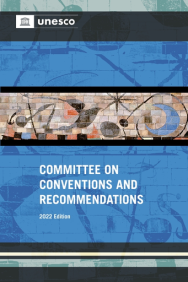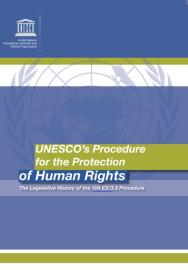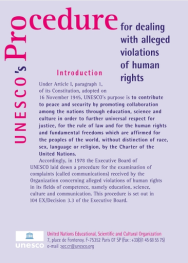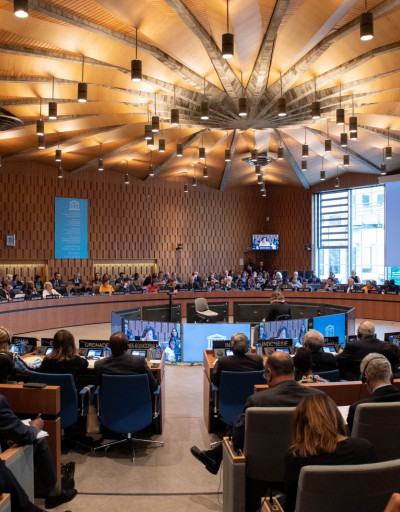

Committee on Conventions and Recommendations of the Executive Board
The Office of International Standards and Legal Affairs serves as the Secretariat of the Committee on Conventions and Recommendations of the Executive Board.
The Committee on Conventions and Recommendations (CR Committee) is one of the permanent subsidiary bodies of the Executive Board, which consists of 28 members elected by the Board for each biennium. It meets in principle twice a year on the occasion of the sessions of the Executive Board (it may also be convened in extraordinary sessions if the Board considers it necessary).
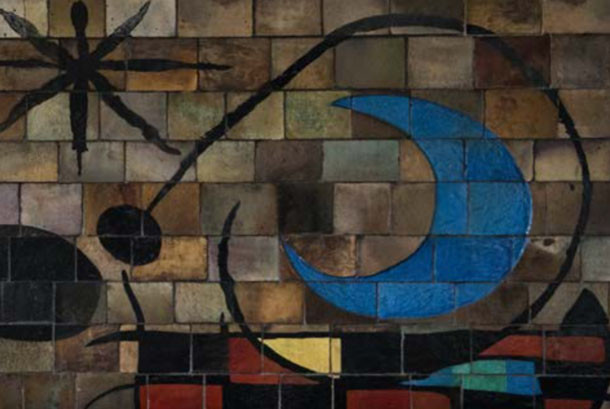
Functions of the CR Committee
The mandate of the CR Committee has two complementary components:
1. Monitoring of the implementation of UNESCO’s standard-setting instruments
Pursuant to Article 18.1 of the Rules of Procedure concerning Recommendations and International Conventions, the CR Committee considers all questions entrusted to the Executive Board concerning the implementation of UNESCO’s standard-setting instruments (conventions and recommendations). It receives and examines reports from Member States concerning the implementation of those instruments.
2. Examination of communications relating to human rights in UNESCO’s fields of competence (104 Procedure)
Pursuant to 104 EX/Decision 3.3 (1978) of the Executive Board, the CR Committee examines communications received by the Organization concerning cases and questions of violations of human rights within UNESCO’s fields of competence.
History of the CR Committee
It was in 1965, at its 70th session, that the Executive Board, ‘having noted resolution 16.1, adopted by the General Conference at its 13th session, on the plan prepared by the Director-General concerning the submission of periodic reports by Member States on their implementation of the Convention and Recommendation against Discrimination in Education’ decided that ‘the reports submitted by governments shall be … examined by a … special committee of the Executive Board …’ (70 EX/Decision 5.2.1).
At its 71st session the Board decided, in order to implement the above-mentioned decision, to set up ‘a Special Committee … to examine the reports of Member States on the implementation of the Convention and Recommendation against Discrimination in Education’ (71 EX/Decision 3.2).
This Committee was set up anew by the Board at its 75th session, as the ‘Special Committee on Discrimination in Education’ (75 EX/Decision 6.II).
At its 77th session, under item 8.3 of its agenda, entitled ‘Procedure for handling communications on individual cases involving human rights in education, science and culture’, the Board, having decided on the procedure to be followed, requested ‘the Director-General, in accordance with the said procedure, to bring the communications in question to the notice of the Special Committee on Discrimination in Education’ and decided ‘to extend the terms of reference of the Committee for this purpose’ (77 EX/Decision 8.3).
The General Conference, at its 15th session (1968), invited the Board: firstly, ‘to extend the term of office of its Special Committee on Discrimination’ (15 C/Resolution 29.1) and, secondly, ‘to make appropriate arrangements for reports by Member States on the implementation of conventions or recommendations to be examined by a subsidiary organ of the Board, such as the Present Special Committee on Discrimination in Education …’ (15 C/Resolution 12.2).
The Executive Board, at its 81st session, taking account of the above-mentioned 15 C/Resolution 29.1 again set up its Committee (81 EX/Decision 6.II).
At its 82nd session, under item 4.2.4 ‘Implementation of the Recommendation concerning the Status of Teachers’, the Board, being of the opinion that its Committee on Discrimination in Education could be given the task of examining the report of the Joint ILO/UNESCO Committee of Experts on the application of this Recommendation, decided, when entrusting it with this task, to change the name of the Committee to ‘Committee on Conventions and Recommendations in Education’ (82 EX/Decision 4.2.4).
The Committee was subsequently re-established without a break, at the same time as the other subsidiary organs of the Board, at the Board’s first session after the end of the General Conference.
It should be mentioned that at its 104th session the Board decided that the Committee would henceforth be designated ‘Committee on Conventions and Recommendations’.
Finally, at the 122nd session, this Committee became a permanent Committee of the Board (see 122 EX/Decision 3.6 and 123 EX/Decision 4).
Chairperson of the Committee on Conventions and Recommendations (CR)
H. E. Mr Mustaq MOORAD
Ambassador Extraordinary and Plenipotentiary of Botswana to France
Representative of Botswana to the Executive Board of UNESCO
Permanent Delegate of Botswana to UNESCO
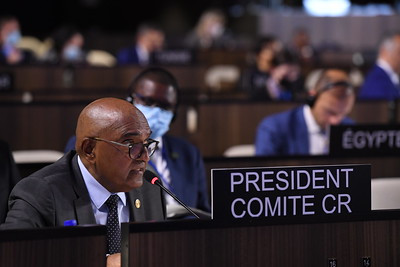
Working documents concerning the CR Committee
Publications
